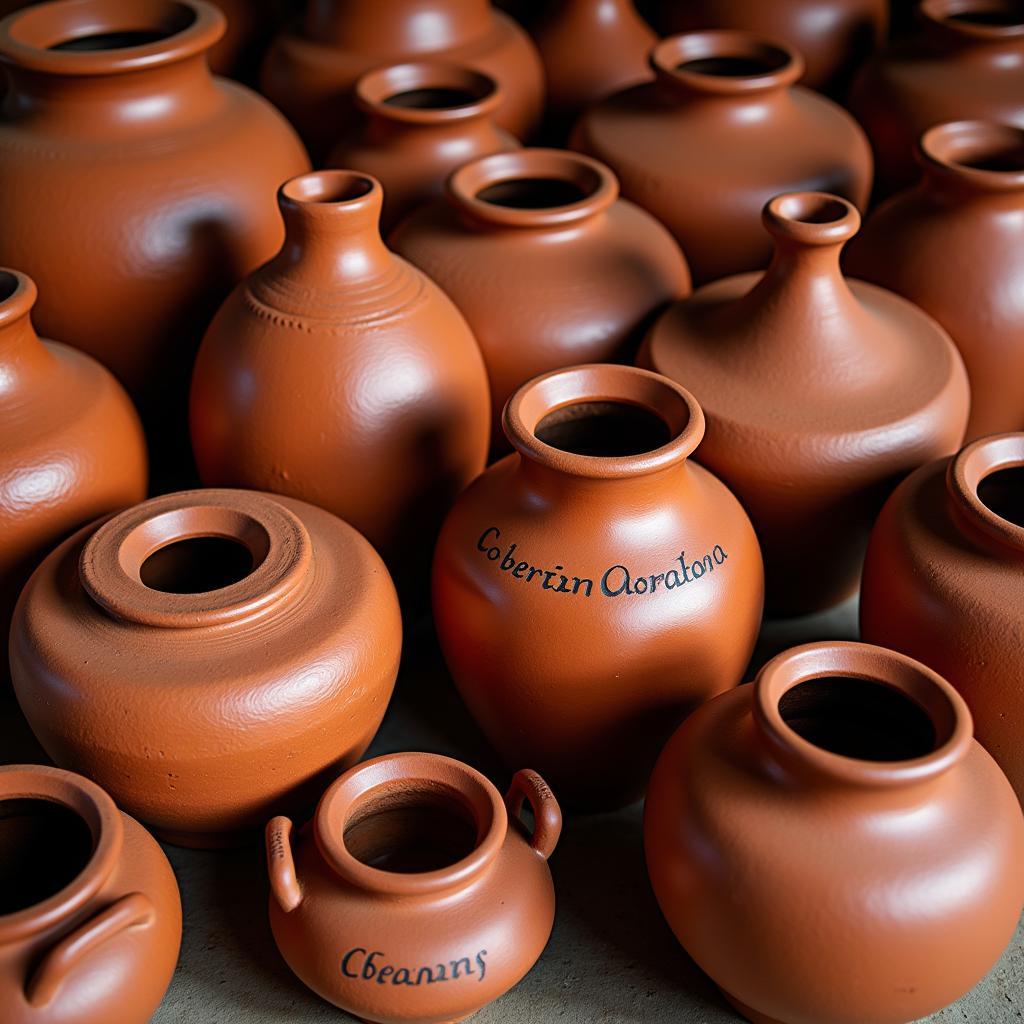The Enduring Allure of the African Clay Cooking Pot
The African Clay Cooking Pot, a humble yet essential vessel found in kitchens across the continent, holds within its earthen walls centuries of culinary tradition and cultural significance. More than just cookware, these pots, known by various names like “clay potjie” or “tagine,” embody a connection to ancestral ways, a celebration of natural materials, and a testament to the enduring power of simple, flavorful cooking.
 African Clay Cooking Pots in Various Sizes and Shapes
African Clay Cooking Pots in Various Sizes and Shapes
A Legacy Passed Down Through Generations
For countless generations, African communities have relied on the humble clay pot as their primary cooking vessel. This enduring tradition speaks to the pot’s effectiveness, affordability, and cultural significance. Crafted from locally sourced clay and often fired in communal kilns, these pots are more than just tools; they are tangible links to a rich culinary heritage. Each pot carries the stories of countless meals prepared, shared, and savored, connecting families and communities through generations.
The Science Behind the Flavor
The unique properties of clay contribute to the exceptional taste of food cooked in these pots. The porous nature of the clay allows for even heat distribution, preventing hot spots and ensuring food cooks gently and thoroughly. This gentle, even heating also helps retain moisture, resulting in tender meats, flavorful stews, and perfectly cooked grains. Furthermore, the clay imparts a distinctive earthy flavor to dishes, enhancing the taste of traditional recipes and elevating simple ingredients.
Benefits Beyond the Kitchen
The appeal of the African clay cooking pot extends far beyond its culinary uses. These pots are celebrated for their environmental friendliness, being made from a sustainable and readily available resource. Their durability ensures they can last for years, even with regular use, promoting sustainability and reducing waste. Additionally, clay pots are believed to offer health benefits. The porous clay can help neutralize acidity and absorb impurities, while the slow cooking process helps preserve nutrients in food.
Adapting to Modern Life
While deeply rooted in tradition, the African clay cooking pot has proven remarkably adaptable to modern life. Today, these pots are not limited to open fires or traditional stoves. They can be used on gas stoves, electric stoves, and even in ovens, making them a versatile addition to any kitchen. Moreover, the rising interest in global cuisine and traditional cooking methods has introduced the African clay pot to a new generation of food enthusiasts worldwide.
Caring for Your Clay Pot
Proper care ensures your African clay cooking pot can provide years of culinary enjoyment. Before first use, it’s essential to season the pot by soaking it in water and then rubbing the interior with oil. This process helps prevent cracking and extends the pot’s lifespan. Clay pots are best washed by hand with warm water and a gentle scrub. Avoid harsh detergents or abrasive cleaners, which can damage the clay.
More Than Just a Pot
The African clay cooking pot represents a tangible link to the continent’s rich culinary heritage. It’s a symbol of community, sustainability, and the enduring power of simple, flavorful food. Whether simmering a hearty stew, slow-cooking a flavorful tagine, or preparing a pot of aromatic rice, the African clay cooking pot offers a unique and rewarding cooking experience.
FAQs
1. Can I use an African clay cooking pot on an electric stove?
Yes, African clay cooking pots can be used on electric stoves. However, it’s essential to use a heat diffuser to prevent cracking due to direct heat.
2. Where can I buy an authentic African clay cooking pot?
Authentic African clay cooking pots can be found in specialty cookware stores, online retailers, and often in African markets or shops.
3. What are some popular dishes cooked in African clay pots?
Popular dishes include tagines (slow-cooked stews), jollof rice (a flavorful West African dish), and various bean and lentil stews.
4. How do I clean my African clay cooking pot?
Hand wash your clay pot with warm water and a gentle scrub. Avoid using harsh detergents or abrasive cleaners.
5. Why does food taste better cooked in a clay pot?
The porous clay allows for even heat distribution and retains moisture, resulting in more flavorful and tender food.
Exploring Further
Discover more about the art of African cooking:
- Explore our collection of African clay pots for cooking in the UK.
- Find inspiration with these authentic African cooking recipes.
- Learn about the rich African brown texture that defines these beautiful pots.
Need assistance or have questions? Contact us at:
Phone: +255768904061
Email: kaka.mag@gmail.com
Address: Mbarali DC Mawindi, Kangaga, Tanzania
Our dedicated customer support team is available 24/7 to assist you.




